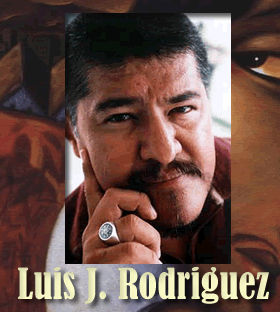LITR 4332: American Minority
Literature

Student Poetry Presentation 2004
Luis J. Rodriguez, “We Never Stopped Crossing Borders”
UA 6
Reader: Jamie McGuire
Respondent: Natalie C. Leonard

http://www.luisjrodriguez.com/logo.jpg
About the author:
Lewis J. Rodriguez was born in 1954. From ages 11 to 19 he joined a gang, used drugs, dropped out of school, kicked out of his house, became homeless, arrested for misdemeanors and felonies, and at 18 he was facing a six-year prison sentence that was reduced due to community support.
He has
spent twenty years conducting workshops, readings, and talks in prisons,
juvenile facilities, homeless shelters, migrant camps, universities, public and
private schools, conferences, Native American reservations, and men’s retreats
throughout the United States.
Luis
is a cofounder of Tia Chucha’s Café Cultural, which is a bookstore, coffee
shop, performance space, art gallery, and computer.
Awards: 19 +
Books:
7
Children's
Biography: 2
Anthologies, Textbooks and Photo Books:122 entries
Magazines
& Newspapers: 216 entries
Official Website: http://www.luisjrodriguez.com/index.htm
Objectives:
1b voiceless and choice less
2b class as a repressed subject
3c ambivalent minority
5a hear the minority voice and share the minority experience
Literary Terms:
Allusion A
brief reference to a person, place, thing, event, or idea in history or
literature. Allusions conjure up biblical authority, scenes from Shakespeare’s
plays, historic figures, wars, great love stories, and anything else that might
enrich an author’s work. Allusions imply reading and cultural experiences
shared by the writer and reader, functioning as a kind of shorthand whereby the
recalling of something outside the work supplies an emotional or intellectual
context, such as a poem about current racial struggles calling up the memory of
Abraham Lincoln.
Connotation Associations
and implications that go beyond the literal meaning of a word, which derive from
how the word has been commonly used and the associations people make with it.
For example, the word eagle connotes ideas of liberty and freedom that have
little to do with the word’s literal meaning.
http://www.bedfordstmartins.com/literature/bedlit/glossary_a.htm
Interpretation:
November 19, 2002
Reader: Dan Negrotto
Luis J. Rodriguez like the Mexican-American minority was forced to participate in the dominant culture. Part of America already belonged to Mexicans; therefore, we must ask, "Did they come to America or were they already here?". Mr. Rodriguez points out the many barriers placed in the path of the Mexican-American by the dominant white culture. Mr. Rodriguez uses the Rio Bravo vs. Rio Grande to show that these barriers did not exist to the Mexican, until the white dominant culture arrived. He used his poem to help "others" hear the minority voice. Finally, Mr. Rodriguez noted, "We were invisible people" and "This is not your country". He used these statements to show how the Mexican-American minority is viewed in relation to the dominant culture and its systems.
My Interpretation:
He
sets up the poem in the beginning by implying that throughout history they have
continually encountered obstacles, which
they have had to overcome. Rodriguez
says that Mexicans call it Rio Bravo and renaming it instills power into the
name. The term “bravo” means
brave in Spanish. The people who
choose to cross the river had to be brave; there was no guarantee
that they would make it across alive.
They were willing to take
this risk because it meant a new beginning, a chance at a future for their
selves and their families; because if they stayed where they were they knew only
a life without hope, without a future was waiting for them.
Those who choose to cross the boarder also knew that their would be
boarders waiting for them in other forms holding them back until they discovered
a way to cross them as well.
Questions:
1.
How does “Don’t speak Spanish, don’t be Mexican – you don’t belong”
relate to “we were invisible people”?
2.
He says, “It was a metaphor to fill our lives – that river, that first
crossing, the mother of all crossings”, why is it a metaphor?
Metaphor A
metaphor is a figure of speech that makes a comparison between two unlike
things, without using the word like or as. Metaphors assert the identity of
dissimilar things. Metaphors can be
subtle and powerful, and can transform people, places, objects, and ideas into
whatever the writer imagines them to be. An implied metaphor is a more subtle
comparison; the terms being compared are not so specifically explained.
3.
Why would he include the refrain “this is not your country” and say that it
has “echoed for a lifetime”?
Does
this have any relation to number one?
THIS IS NOT YOUR COUNTRY Lyrics
Artist (Band): Morrissey
http://www.sing365.com/
Road blocks and fire
Barb wire upon barb wire
This is not your country
Armoured cars, corrugated scars
Grafitti scrawls:
"This is not your country"
Home sweet fortress
Gunshot - we hate your kind
Get back !
This is not your country
Luis: "... Borders, therefore, have nothing to do with biology, geography (even if some borders follow along rivers and mountain ranges) or spirituality. They are political and historically bound creations, seemingly forever, yet transient and ever changing. Robert Frost once wrote that fences make good neighbors. But for countries, these same "fences" tend to disconnect and often enemize (a new word) each other."
http://www.pbs.org/pov/pov2002/borders/talk/dialogue003_lr_6q.html